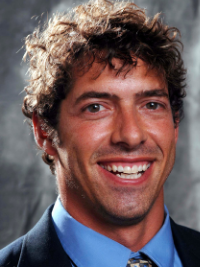Eric W. Montie, MS, PhD
Professor of Biology
Department of Natural Sciences

I am a Full Professor of Biology at the University of South Carolina Beaufort, where I direct the Marine Sensory and Neurobiology Lab. I also lead two long-term programs: the Estuarine Soundscape Observatory Network in the Southeast (ESONS), which uses passive acoustic monitoring to track marine life and noise in South Carolina estuaries, and the Lowcountry Dolphin Conservation Program, which studies the population dynamics and ecology of bottlenose dolphins in the Port Royal Sound area.
My academic journey includes a B.S. in Zoology from the University of Rhode Island, post-baccalaureate studies in Biochemistry at Harvard University, an M.S. in Environmental Toxicology from Clemson University, and a Ph.D. in Biological Oceanography from the MIT–Woods Hole Oceanographic Institution (WHOI) Joint Program. Since joining USCB in 2011, I have been committed to mentoring undergraduate and graduate students through immersive fieldwork and advanced data analysis. I also serve as a major advisor for students enrolled in the thesis option of the MS Computational Science Program, guiding projects at the interface of marine ecology, bioacoustics, and computational modeling. My work has been recognized at the USC level with the Breakthrough Rising Star Award in 2013 and the Governor’s Award for Excellence in Scientific Research at a Predominantly Undergraduate Institution in 2021.
My research program integrates bioacoustics, marine mammal biology, fish ecology, and environmental change. The central goal is to understand how estuarine and coastal ecosystems respond to stressors such as urbanization, stormwater runoff, salinity shifts, climate extremes, vessel traffic, and noise pollution.
A key part of this work is the Estuarine Soundscape Observatory Network in the Southeast (ESONS), founded in 2020. ESONS deploys passive acoustic recorders across multiple estuaries to continuously monitor the underwater soundscape. These recordings capture the crackling of snapping shrimp, the calls of spawning fishes, dolphin communication and foraging sounds, and the rising influence of human-made noise. By “listening” to these soundscapes over long timescales, we can detect shifts in animal behavior, track ecosystem resilience, and identify early warning signals of stress. In parallel, I direct the Lowcountry Dolphin Conservation Program, which focuses on the population ecology of Tamanend’s bottlenose dolphins in the Port Royal Sound region. This program monitors abundance, health, and habitat use, with an emphasis on how dolphins respond to environmental stressors and human activity.
My students and I combine field-based science with computational approaches — including R, MATLAB, and Python — to analyze these long-term datasets. This unique training prepares them for careers in marine biology, data science, and conservation. Ultimately, our work provides actionable knowledge that helps protect marine life and supports the sustainability of coastal communities in the Lowcountry and across the Southeast.
- Education
- Teaching
- Research
MS in Environmental Toxicology, Clemson University (1999)
PhD in Biological Oceanography, MIT/WHOI Joint Program (2006)
- B102 Biological Principles II
- B295 Directed Studies in Biology
- B395 Advanced Directed Studies Biology
- B435 Neurobiology
- B435L Neurobiology Laboratory
- B436 Ichthyology
- B438 Marine Mammal Biology
- B438L Marine Mammal Biology Lab
- B499 Topics in Biology
- Acoustic communication of marine life
- Soundscape ecology
- Fish and bottlenose dolphin population monitoring
- Impacts of stressor on marine organisms and ecosystems
- Noise pollution
- Environmental toxicology
- Climate change